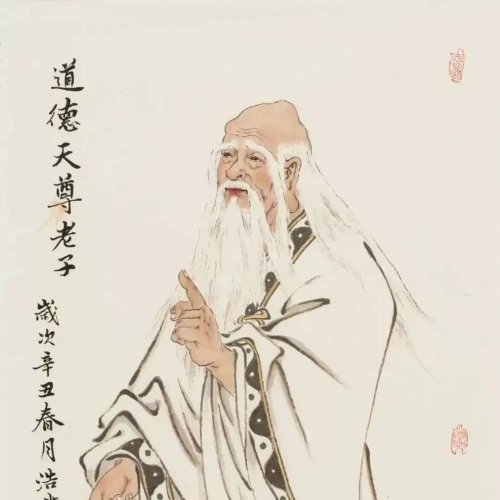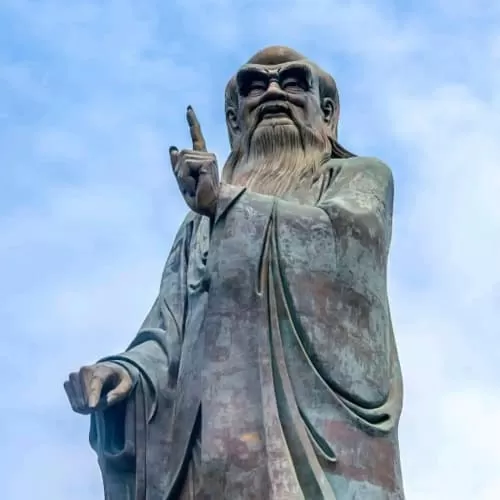
Laozi (c. 571 BC – c. 470 BC, or alternatively 571 BC – 471 BC), born Li Er with the courtesy name Dan or Boyang (or posthumously honored as Boyang), was a figure from the Spring and Autumn period. Historical records such as Records of the Grand Historian and Book of the Later Han document his birthplace as either the state of Chu or Chen, specifically in Qurenli, Lixiang (or Laixiang) village of Ku County (present-day Luyi County, Henan Province), though some sources suggest modern-day Guoyang County, Anhui Province. Renowned as an ancient Chinese philosopher, thinker, writer, and historian, he founded and became the primary representative of the Daoist school, often mentioned alongside Zhuangzi as "Lao-Zhuang." During the Tang dynasty, he was posthumously recognized as the founding ancestor of the Li surname. He has been honored as a global cultural icon and is listed among the world's 100 most influential historical figures.
Serving as the archivist of the royal library of the Zhou dynasty, Laozi gained fame for his erudition, attracting Confucius to seek his counsel on rituals. Amid the chaos of the late Spring and Autumn period, he resigned to pursue reclusion, riding westward on a green ox. At the Hangu Pass, he complied with the request of the guard Yin Xi and composed the Dao De Jing.
Laozi's philosophy profoundly shaped the development of Chinese thought, centered on a dialectical worldview rooted in simplicity. Politically, he advocated for governance through non-action (wuwei) and teaching without words. In strategy, he emphasized the principle that "reversal is the movement of the Dao." For self-cultivation, he promoted practices of humility, inner tranquility, and non-contention, establishing the Daoist foundation of harmonizing spiritual and physical refinement.
His enduring work, the Dao De Jing (also known as Laozi), stands as one of the most widely published texts in world literature.
| Chinese name | Laozi |
| Foreign name | LaoZi/Lao-Tzu |
| alias | another name of Lao-tzu |
| nationality | China |
| nationality | Huaxia ethnic group |
| date of birth | Around 571 BC |
| date of death | 470 BC (some say 471 BC) |
| Main achievements | Establishing the Taoist school of thought, spreading the theory of Taoist thought, proposing the principles of natural law, governing by inaction, and dialectical thinking |
| birthplace | Ku County of Chu State (according to "Records of the Grand Historian") or Ku County of Chen State (according to "Book of Later Han") |
| Representative works | Laozi (Tao Te Ching) |
| Original name | Laozi |
Chu State (or Chen State) around 571 BC (the first year of King Ling of Zhou's reign, corresponding to the second year of Duke Xiang of Lu and the fifth year of Duke Ping of Song). According to Shiji: Biographies of Laozi and Han Feizi, Laozi (Li Er) was a native of Qurenli community in Lixiang village, Ku County, Chu State. Due to discrepancies in historical records, scholars throughout history have held differing views on Laozi's birthplace, with three primary interpretations emerging: Chu State, Chen State, and Song State. For detailed discussions, see the "Controversy over Birthplace" section of this entry.
In 551 BC (the 21st year of King Ling of Zhou), Laozi was appointed as the Archivist of the Royal Library (keeper of archival records) for the Zhou court. Prior to this recommendation, he had studied under Chang Cong (also known as Shang Rong).
In 535 BC (the 10th year of King Jing of Zhou), Laozi was dismissed from his position due to political exclusion by influential nobles under Duke Jian of Gan. During this exile, he traveled to the State of Lu, where he presided over a friend’s funeral in Xiangdang. The 17-year-old Confucius assisted in the rites and inquired about rituals from Lao Dan (Laozi).
In 530 BC (the 15th year of King Jing of Zhou), Laozi was reinstated as Archivist by Duke Ping of Gan.
In 526 BC (the 19th year of King Jing of Zhou), the 26-year-old Confucius visited the Zhou capital to observe court customs and sought an audience with Laozi.
In 516 BC (the 4th year of King Jing of Zhou), Laozi was dismissed after the royal archives were seized by Prince Chao and taken to Chu. He returned to his hometown and later journeyed to the State of Qin (exact timing unclear).
In 501 BC (the 19th year of King Jing of Zhou), Confucius, then 51, traveled south to Laozi’s homeland to seek wisdom from him.
Laozi's legacy is primarily enshrined in the Laozi (also known as Dao De Jing or De Dao Jing), which alongside the I Ching and Analects forms the triad of texts that have most profoundly influenced Chinese thought. While its exact compilation date remains debated, the 1993 discovery of the Guodian Chu Slips (containing the earliest extant Laozi fragments) confirms it existed by the mid-early Warring States period (c. 4th century BC). Some scholars argue the text evolved through multiple authors over time.
Originally titled Laozi (without Dao De Jing), this ≈5,000-character work was later renamed and divided into 81 chapters across two sections:
Dao Jing (Chapters 1-37): The "Classic of the Way"
De Jing (Chapters 38-81): The "Classic of Virtue"
Philosophical framework: Dao (the Way) serves as the substance, while De (Virtue) manifests as its function.
Dialectical Unity of Opposites
All phenomena exist relationally: beauty/ugliness, good/evil, being/nonbeing, difficulty/ease, and long/short are interdependent and co-arising.
Apparent contradictions contain mutual permeation: "Disaster hides behind good fortune; good fortune lurks within disaster." (Chapter 58)
Nothing remains static—change is intrinsic.
The Law of Reversal (反者道之动)
Extreme development triggers reversal: "What is overly strong cannot last; what is overly sharp cannot endure." (Chapter 55)
Transformation follows the cyclical rhythm of the Dao.
Accumulative Transformation
Macro changes emerge from micro-accumulation:
"A giant tree grows from a sapling;
A nine-tiered tower rises from piled earth;
A thousand-mile journey begins beneath one's feet." (Chapter 64)
Confucius (c. 551–479 BC):
"Birds fly, fish swim, beasts run—all may be captured by nets or arrows. But the dragon riding wind and clouds eludes comprehension. Meeting Laozi today, I find him like the dragon!"
(Analects, reconstructed)
Sima Qian (c. 145–86 BC):
"Laozi honored the Way—formless, nameless—adapting through non-action. Thus his writings remain profoundly elusive."
(Records of the Grand Historian)
Yang Xiong (53 BC–AD 18):
"Laozi’s discourse on Dao and De holds merit. Yet his demolition of benevolence and ritual makes his philosophy incomplete."
Han Yu (768–824):
"When Laozi diminished benevolence and righteousness, it was not slander but limited perspective."
Zhu Xi (1130–1200):
"Laozi’s methods demand absolute self-assuredness. At the slightest personal inconvenience, he withdraws—utterly self-serving."
Lin Xiyi (1193–?):
"His teachings—'governing through non-action' and 'prevailing without contention'—align with wisdom. Only his iconoclastic rhetoric tends toward excess."
Wang Fuzhi (1619–1692):
"Laozi’s threefold flaw: deliberate contrarianism breeds injustice; arbitrary assertions lack classical grounding; forced ingenuity invites calamity."
Hu Shi (1891–1962):
"Laozi’s singular achievement: postulating the ‘Dao’—transcending conventional cosmology to establish metaphysical foundations."
The exact birth and death years of Laozi remain unverified in historical records, with significant scholarly debate even regarding whether he preceded or succeeded Confucius. Due to insufficient historical evidence, academic opinions on Laozi’s life vary widely. Among existing sources, Sima Qian’s Records of the Grand Historian: Biography of Laozi provides the most systematic account, claiming Laozi lived 160 or over 200 years and noting Confucius sought ritual instruction from him.
Hu Shi (1891–1962):
"Laozi was at most 20 years older than Confucius, likely born around 570 BC during King Ling of Zhou’s reign."
(Outline of the History of Chinese Philosophy)
Fu Sinian (1896–1950):
Rejected the Confucius-learning-from-Laozi legend, arguing Laozi postdated Confucius as Daoism’s founder.
Feng Youlan (1895–1990):
"Whether a man named Lao Dan existed before or alongside Confucius is irrelevant—the Laozi text undoubtedly postdates Confucius."

Provides The Most Comprehensive English Versions Of Chinese Classical Novels And Classic Books Online Reading.
Copyright © 2025 Chinese-Novels.com All Rights Reserved
